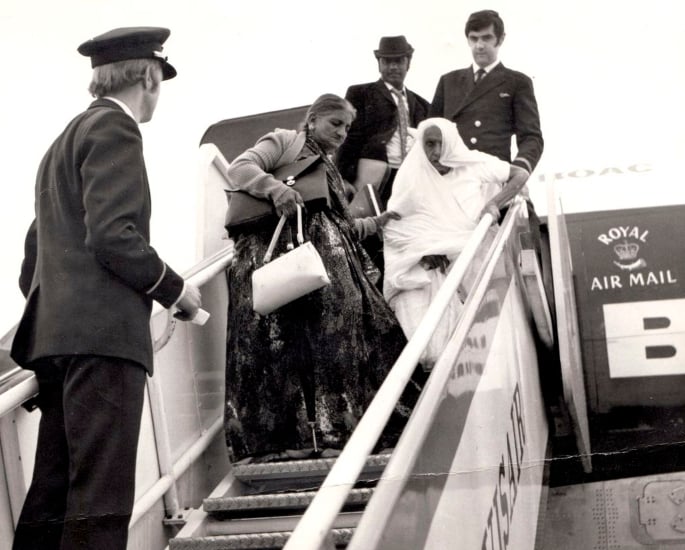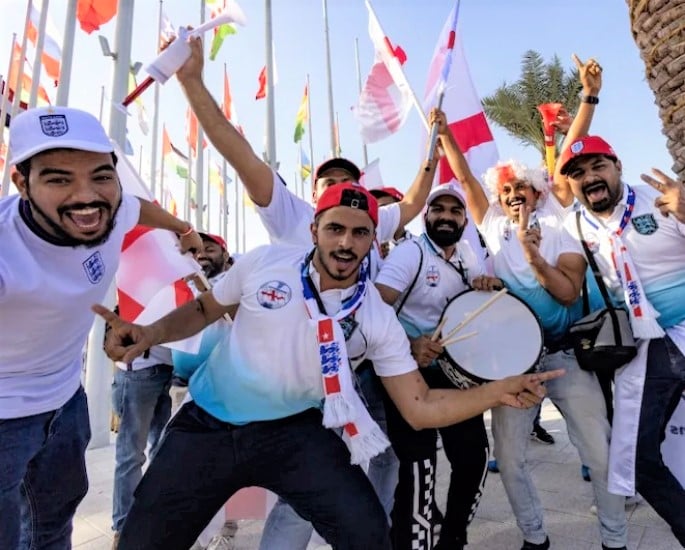Has Support for England grown among British Asians?
As the England team continues to grow in major football competitions, can we say support for the team has increased among British Asians as well?
In the 60s and 70s, it was a rare sight to see people wearing an England football shirt among those who migrated from South Asia or were born in Britain.
There was a resentment that existed primarily due to the harsh racism immigrants from South Asia received from the indigenous white population.
This led to internalised hatred, fear and scaremongering among communities from South Asian backgrounds who migrated to Britain. The notion of not feeling safe ‘outside’ became a reality.
This perpetuated into communities forming where people from the same backgrounds began to live or socialise together rather than integrate into British society wholeheartedly.
Football was also associated greatly with racism. Therefore, even going to a football match was not deemed safe.
Stories of drunk hooligans fighting or beating up Asians in town centres after or before a match were common.
However, through time more and more British Asians are now seen watching Premier League teams in the terraces of the grounds with comfort and even fan groups have been formed for specific teams.
So, in a progressive time when a Prime Minister of Indian origin is leading the United Kingdom and Britain, have people from South Asian backgrounds changed their attitudes toward supporting England in football?
We spoke to British Asians to find out their thoughts and feelings about supporting England.
Early Generations & Racism


Post-1947, and more specifically during the 70s and 80s, there was a mass migration of South Asians to the UK.
During this time, there was a lot of turmoil lingering from the Partition and most people came to the UK to find a better and more sustainable life.
However, most of the South Asians that made the trip weren’t faced with opportunities and space to excel.
Instead, they were met with racism, discrimination and violent behaviour.
Whilst this type of tension was rife for years, some South Asians still tried to fit in and embody the culture around them.
Wearing England shirts, trying to play football and going to the local pubs were all attempts of getting included in the community.
However, it turns out that a lot of Britains didn’t take too well to this. Maninder Khan, a 62-year-old shop owner originally from India speaks more on this:
“It was so bad when me and my family first came over. When I opened my shop, I didn’t get any customers.
“When someone did walk through the door, they’d see me and then walk straight back out. I also got a lot of kids coming in and knocking stuff over or breaking bottles.
“I couldn’t do anything because their parents, the neighbourhood, and the community were the same. They hated us.
“When I had my kids, it was no different.”
Maninder expresses how tough it was for South Asians to exist peacefully in society and hints at how this didn’t stop for first-generation British Asians.
Maninder’s son, Karan, shares his experiences:
“When I tried playing football, the other kids wouldn’t let me join in. They’d always tell me to be the ball boy or sit out and watch.
“I’ve grown up watching football and when I wore the kit to school for sports day, the other kids would tell me to take it off.
“One boy told me that I’d make the smell shirt of curry and English people don’t smell like that.”
“It was a very tough time because you’re trying to figure out who you are as a person and where your place is.”
What added to this sense of identity and belonging were the challenges people like Karan would get from their own family or community members.
The elder generation would often say “how can you support England after how they treat you here?”.
Racism and colonial rule inhibited support for English football, especially the team. Therefore, many Asians turned to other nations such as Brazil and Argentina. But why?
Jatinder Grewal, a lifelong Liverpool FC fan explained his stance regarding this:
“When me and my mates were younger, we all supported the other South American or European teams.
“We could barely support South Asian teams because they put all their effort into cricket. Then when we tried to support England, we’d get harassed.
“So, it was easier (and better at times) to support the likes of Ronaldinho, Maldini, Maradona, Zidane, etc.
“It actually made me appreciate football more by watching those players. Although, I’d always have a soft spot for England.
“I couldn’t support them publicly. My family and I used to watch the games at home and would cheer for them. But we’d have to hide it.”
Manisha Rai, a 40 year old mother from Nottingham has a different view. She saw no relevance in supporting England when her parents moved from India in 1981:
“When I was growing up, I got bullied by English people for all the things that make me Asian.
“My hair, skin colour, and clothes were all fuel for kids to pick on me. When I saw the other Asian boys wearing England tops, whether it was football or cricket, I’d be disgusted.
“These same kids that are growing up are in our police force, parliament, and higher occupations with the same mindset.
“I don’t and would never support England. I’ll watch football but I just think, why to support a country that hasn’t supported the people within it, especially the coloured ones.”
It shows how difficult it was to exist within the UK for South Asians.
Although they tried to fit in or find their way in society, they were pushed back by the beliefs that they didn’t belong.
Is the UK Home?


Whilst the first-generation British Asians experienced nasty comments and torment from the surrounding communities, have things changed for the generations after?
Inclusivity and diversity have progressed since the 60s and 70s.
South Asia itself has become engrained as part of British culture. For example, the national dish of the UK is a curry – chicken tikka masala.
So, are younger generations now feeling ‘more at home’? And in turn, is this influencing the British Asian support of the England team? Kirandeep Singh from Worcester stated:
“I’ve never been to India so I relate much more to life in the UK than I do back home.
“My parents have raised me with certain ideas and traditions but even with cricket, I support England – which doesn’t go down too well.
“But I watch more football and me and my mates go and watch England play which is a good time.
“Even as girls now, being a part of the sport is something we couldn’t imagine so many years ago. I support England because I’m from here and I feel like I’m part of their success.”
Narinder Gill, a 30-year-old from Essex has a similar opinion:
“I’ve always supported England from when I was young because I don’t see our home countries striving in the sport.
“But, I was born here and although I wish South Asian countries were better at football, they’re not. And, you have to lend your support to the team that makes the most sense.
“Asians are part of English culture. I think people realise that more now than they did before. That’s why there was so much racism back then.
“English people thought we’re here to make the UK like South Asia – but no.
“We’re here to learn from each other and having a multicultural society is what makes the UK so great.”
“So, football is the same. Whilst the team is predominantly white, that doesn’t matter. The backing it gets is from a variety of people.”
Mohammed Tarif*, a student from Cardiff has another take:
“The UK is home, yes. But, it’s also a place that is always against our people.
“No matter how hard we try to fit in or be a part of British culture, they won’t ever accept us fully. I watch a variety of sports and all of them, I try and support my homeland.
“It’s not because I don’t appreciate where I was born and where I’m from, but it’s because it doesn’t appreciate me.
“Look at football. Where are the Asian players? Why can’t they break into teams? Why aren’t they developed or worked on as much as other players?”
Whilst it seems most younger British Asian feel like the UK is their home, there are still feelings that South Asians are repressed in society.
Cricket vs Football


Whilst there is a conflict within football as to why South Asians don’t support their own national countries, the same doesn’t go for cricket.
The England cricket team are hardly supported by British Asians. If the Indian or Pakistan teams are playing in the UK, British Asians will support their heritage and homelands.
South Asians’ strong love for cricket stems from the long history of success the countries have had in the sport.
With the success comes funding, promotions, attention, and acknowledgment of talent. But, the same cannot be said for football where the national teams are non-existent.
But does the sport matter when you’re picking a country to back? If England were to play Pakistan in cricket, then British Pakistanis would support the latter.
However, if it was the same matchup in football, the number of supporters for Pakistan wouldn’t be as high. Azim Ahmed, a 49-year-old factory worker from Coventry explains:
“Cricket and football are different. A lot of Asians think cricket is our sport, where we can show how skilled our people are.
“It is true as our countries have had the most successful and talented athletes in the sport.”
“But, when it comes to football, we have no one to support, so we have to turn to the country where our home is.
“Listen, if I’m born in England and watching the World Cup and I say I support France, I can see why people would get annoyed.
“But I support England, I consider it my home. If Pakistan had a world-class team, then I’d support them in football too.”
DESIblitz asked Azim if supporting a team matters on their quality:
“Well partly yes. You can’t tell me that if India or Pakistan played international football at the highest level, we wouldn’t all support them.
“But, they don’t. So, we turn to the next team that makes sense. That’s why I don’t understand why British people were so racist to us in the past.
“It’s different now but you still get those hooligans who think England should be backed by ‘proper’ English fans aka white people.”
Ariah Kilsi, a 45-year-old nurse from London agrees with Azim:
“I’ve been brought up in a house full of boys. They’re all football fanatics and cheer for England when they score a goal.
“But the week after when India are playing England in the cricket, they’re swearing at the English players. It’s quite funny.
“I didn’t understand it when I was younger but I do now.
“My dad always said a country should be happy if people who don’t originate from there support it, even if it’s some of the time because support is unity.”
Despite the contrasting views on support for national teams in different sports, it’s clear that South Asian football teams aren’t widely known.
Likewise, there’s no backing from the governments to fund these football teams to succeed on the world stage.
Therefore, British and South Asians have to turn to other countries to support when it comes to football.
Is Support for England Growing?


Although the debate between cricket and football is limitless, there is evidence that British Asian support for England is growing.
This is not just because of modern generations and a more inclusive society, but because of more diversity within UK football itself.
For example, there was a major outpour of positivity when Zidane Iqbal signed a professional contract with Manchester United.
Likewise, Dilan Markanday made history by making his first-team debut for Tottenham Hotspur in European competitions in 2021.
In the same year, British Indian Arjan Raikhy also made a surprise debut for Aston Villa in the third round of the FA Cup against Jurgen Klopp’s Liverpool.
There was more history within the UK in 2022 when British Indian, Brandon Khela signed a professional contract for Birmingham City, the first Punjabi person to do so.
However, it’s not just men who are making strides within the sport.
Along with Brandon, fellow Blues academy player, Layla Banaras, sent shockwaves in the sport due to her young but mature stance on having more Asian footballers.
She follows in the steps of Coventry United midfielder Simran Jhamat and Blackburn Rovers player, Millie Chandarana.
So, there is a catalogue of British Asians who are finally getting the push and support they deserve in shining within the beautiful game.
This is pushing more British Asians to follow football and support England. Laila Shein, a 23-year-old Arsenal fan said:
“I like that I’m seeing more people that look like me playing for major clubs. But it’s also making me feel more comfortable about supporting England.
“Even seeing black players thriving in the team is a win. Although, you can see how much racism still exists like when the Euro final happened.
“Imagine if those were brown players. They’d be called terrorists, immigrants and racist names. So, whilst a change is there, it still needs to improve.”
Bilal Khan, an 18-year-old student from Northampton also shared his view:
“When I was younger, I didn’t pay much attention to international football. But with our recent success, I feel like I’ve been drawn to it more.
“I feel like there’s a different aura about this team. Before, all the team were white and barely had any coloured people.
“But now, some of our best players are coloured so I think more brown and black kids feel it’s a more representative team.”
Amandeep Kaur, a 28-year-old from Newcastle agrees with Bilal:
“England are a fantastic team and I feel like even our elders are supporting the team more.”
“There’s a change in the team and the way they are treated. Maybe that’s because of social media and the awareness of racism and discrimination, so people are more careful about how they treat others.
“I think that’s why the support has grown for England from all members of the community.
“We sympathise with them, especially the black players. I just hope we can see more brown people put on the white jersey.”
It’s evident that England are receiving more support than ever with the rise of diversity in football.
Whilst there are some people still on the fence as to whether England should be supported, the overwhelming opinion is in favour of the national team.
The rise in British Asian footballers is one of the main reasons for this surge.
As teams represent wider society and all the communities that make the UK so diverse, then the support will grow even further for England.
However, it still has some work to do to provide a platform for more British and South Asians to thrive with all the talent they possess.